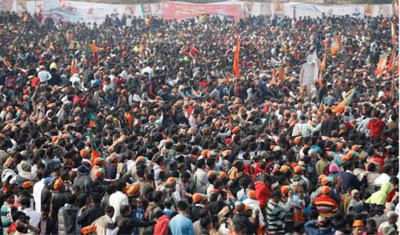Coronavirus cases fueled by the highly transmissi-ble omicron variant are rocketing through India, prompting the federal government and states to swiftly reintroduce a string of restrictions.
Night curfews are back. Restaurants and bars are running at half their capacity. Some states have closed schools and movie theaters. Large gatherings are to be downsized.
But India’s political leaders are busy on the campaign trail ahead of crucial state polls, address-ing packed rallies of tens of thousands of people, many without masks.
The scenes are strikingly similar to last year’s election season, when the delta variant ravaged the country and made India one of the world’s worst-hit countries. Some political parties have begun to cur-tail their campaigns and halt a few rallies, but health experts worry that the lessons learned last year have already been forgotten.
“The highly transmissible omicron variant chases and catches you. But our politicians are out there to welcome it with a hug,” said Dr. T. Jacob John, an Indian virologist. “I fear it is beginning to look a lot like last year.”
A devastating surge of infections tore through India last year. It was partly fed by large crowds at election rallies, where politicians, including Prime Minister Narendra Modi, often appeared without masks and addressed teeming crowds. That surge left the country’s health system bat-tered, with people begging for oxygen and hospital beds. Crematoriums ran out of space. Daily deaths crossed 4,000 during the peak of the crisis, with at least 200,000 people dying between March and May, a number widely believed to be a vast under-count.
Health officials say the new surge is causing fewer deaths and many cases are asymptomatic. But they warn against taking the omicron variant too lightly, and say that numerous cases, even if milder, could still pressure the country’s fragile health sys-tem.
Overall, new daily cases have increased nearly fourfold in the last week. Hospital admissions are rising and medical staff in some states have been asked to cut short their winter holidays. Cities are experiencing a massive surge, with Mumbai, India’s financial capital, surpassing its previous highest daily count. New COVID-19 cases in five states immersed in election campaigning — Uttar Pradesh Punjab, Uttarakhand, Goa and Ma-nipur — have shot up.
On Saturday, the health ministry said more than 141,986 cases were reported in the previous 24 hours, nearly a 21% increase from the previous day.
Health experts say increased social contact at packed election rallies is feeding the virus spread.
“The transmission chains that started at the beginning of the year due to these rallies will take months to burn out,” John, the virologist, said.
Over the past few weeks, Modi has addressed huge gatherings in several cities, particularly in Uttar Pradesh, the country’s most populous state which is ruled by his Bharatiya Janata Party. The party’s political opponents have also hit the cam-paign trail, flouting health guidelines.
Earlier this week, the Congress party organized a marathon in which thousands of people ran with-out masks and were packed so tightly that they col-lapsed onto each other. The chief minister of New Delhi Arvind Kejriwal, contracted the virus after he was seen maskless while leading political rallies in multiple states.
With health experts warning of a rapid growth in infections, and data suggesting they are spreading faster than during the peak of last year’s surge, sev-eral political parties have started a course correc-tion.—AP










